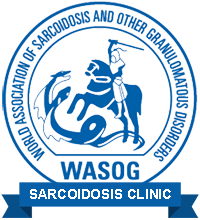Role of Serum Soluble Interleukin-2 Receptor Level in the Diagnosis of Sarcoidosis: A Systematic Review and Meta-Analysis
Keywords:
Sarcoidosis, Soluble interlukin 2 receptor, DiagnosticsAbstract
Background and aim:
Serum Soluble Interleukin-2 Receptor (sIL-2R) levels are used clinically as a disease activity marker for systemic sarcoidosis. Studies have investigated the diagnostic role of serum soluble interleukin-2 receptor (sIL-2R) level for sarcoidosis relative to biopsy. We performed a systematic review and meta-analysis of studies evaluating the diagnostic utility of sIL-2R.
Methods:
We carried out an electronic search in Medline, Embase, Google Scholar, and Cochrane databases using keyword and Medical Subject Heading (MeSH) terms: sarcoidosis and sIL-2R. Studies evaluating the sIL-2R levels as a diagnostic tool in clinically diagnosed or biopsy-proven sarcoidosis patients compared to control groups with non-sarcoidosis patients were included. Forest plots were constructed using a random effect model depicting pooled sensitivity, specificity, positive and negative predictive values, and diagnostic accuracy.
Results:
We selected ten studies comprising 1477 patients, with 592 in the sarcoidosis group and 885 in the non- sarcoidosis group. Pooled sensitivity and specificity of sIL-2R levels were 0.88 (95% CI: 0.75-0.95) and 0.87 (95% CI 0.73-0.94) respectively. Pooled negative predictive value and positive predictive value were 0.91 (95% CI 0.77-0.97) and 0.85 (95% CI 0.59-0.96) respectively with diagnostic accuracy of 0.86 (95% CI 0.71- 0.93).
Conclusion:
In addition to its utility as a marker of sarcoidosis disease activity, sIL-2R has high diagnostic accuracy. Despite the limitations of the heterogenous sarcoidosis population and different sIL-2R cutoffs, our results suggest that sIL-2R is an important biomarker that can be used to confirm sarcoidosis diagnosis in unconfirmed or unclear cases.
References
Crouser ED, Maier LA, Wilson KC, Bonham CA, Morgenthau AS, Patterson KC, et al. Diagnosis and Detection of Sarcoidosis. An Official American Thoracic Society Clinical Practice Guideline. Am J Respir Crit Care Med. 2020 Apr 15;201(8):e26–51.
Kahkouee S, Samadi K, Alai A, Abedini A, Rezaiian L. Serum ACE Level in Sarcoidosis Patients with Typical and Atypical HRCT Manifestation. Pol J Radiol. 2016 Sep 23;81:458–61.
Ramos-Casals M, Retamozo S, Sisó-Almirall A, Pérez-Alvarez R, Pallarés L, Brito-Zerón P. Clinically-useful serum biomarkers for diagnosis and prognosis of sarcoidosis. Expert Rev Clin Immunol. 2019 Apr;15(4):391–405.
Rubin LA, Nelson DL. The Soluble Interleukin-2 Receptor: Biology, Function, and Clinical Application. Ann Intern Med. 1990 Oct 15;113(8):619–27.
Oswald-Richter KA, Richmond BW, Braun NA, Isom J, Abraham S, Taylor TR, et al. Reversal of global CD4+ subset dysfunction is associated with spontaneous clinical resolution of pulmonary sarcoidosis. J Immunol Baltim Md 1950. 2013 Jun 1;190(11):5446–53.
Gungor S, Ozseker F, Yalcinsoy M, Akkaya E, Can G, Eroglu H, et al. Conventional markers in determination of activity of sarcoidosis. Int Immunopharmacol. 2015 Mar;25(1):174–9.
Verwoerd A, Vorselaars ADM, Moorsel CHM van, Bos WJW, Velzen-Blad H van, Grutters JC. Discrepant elevation of sIL-2R levels in sarcoidosis patients with renal insufficiency. Eur Respir J. 2015 Jul 1;46(1):277–80.
Groen-Hakan F, Eurelings L, ten Berge JC, van Laar J, Ramakers CRB, Dik WA, et al. Diagnostic Value of Serum-Soluble Interleukin 2 Receptor Levels vs Angiotensin-Converting Enzyme in Patients With Sarcoidosis-Associated Uveitis. JAMA Ophthalmol. 2017 Dec;135(12):1352–8.
Suzuki K, Namba K, Mizuuchi K, Iwata D, Ito T, Hase K, et al. Validation of systemic parameters for the diagnosis of ocular sarcoidosis. Jpn J Ophthalmol. 2021 Mar;65(2):191–8.
Schimmelpennink M, Quanjel M, Vorselaars A, Wiertz I, Veltkamp M, Van Moorsel C, et al. Value of serum soluble interleukin-2 receptor as a diagnostic and predictive biomarker in sarcoidosis. Expert Rev Respir Med. 2020 Jul 2;14(7):749–56.
Eurelings LEM, Miedema JR, Dalm VASH, van Daele PLA, van Hagen PM, van Laar JAM, et al. Sensitivity and specificity of serum soluble interleukin-2 receptor for diagnosing sarcoidosis in a population of patients suspected of sarcoidosis. PloS One. 2019;14(10):e0223897.
Enyedi A, Csongrádi A, Altorjay IT, Beke GL, Váradi C, Enyedi EE, et al. Combined application of angiotensin converting enzyme and chitotriosidase analysis improves the laboratory diagnosis of sarcoidosis. Clin Chim Acta. 2020 Jan 1;500:155–62.
Gundlach E, Hoffmann MM, Prasse A, Heinzelmann S, Ness T. Interleukin-2 Receptor and Angiotensin-Converting Enzyme as Markers for Ocular Sarcoidosis. PLoS ONE. 2016 Jan 22;11(1):e0147258.
Uysal P, Durmus S, Sozer V, Gelisgen R, Seyhan EC, Erdenen F, et al. YKL-40, Soluble IL-2 Receptor, Angiotensin Converting Enzyme and C-Reactive Protein: Comparison of Markers of Sarcoidosis Activity. Biomolecules. 2018 Aug 28;8(3):84.
Ishihara M, Meguro A, Ishido M, Takeuchi M, Shibuya E, Mizuki N.
Usefulness of Combined Measurement of Serum Soluble IL-2R and Angiotensin-Converting Enzyme in the Detection of Uveitis Associated with Japanese sarcoidosis
. Clin Ophthalmol. 2020 Aug 12;14:2311–7.Unal M, Janssen A (Anouk), Vries L, Molen R, Bredie S, Rongen G. The value of Serum sIL-2R and 18F-FDG-PET/CT for the diagnosis of Ocular Sarcoïdosis in Patients With Uveitis. 2018 Jan 1;1.
Bons JA, Drent M, Bouwman FG, Mariman EC, van Dieijen-Visser MP, Wodzig WK. Potential biomarkers for diagnosis of sarcoidosis using proteomics in serum. Respir Med. 2007 Aug;101(8):1687–95.
Downloads
Published
How to Cite
Issue
Section
License
Copyright (c) 2023 Samiksha Gupta, Miloni Parmar, Rana Prathap Padappayil, Agam Bansal, Salim Daouk

This work is licensed under a Creative Commons Attribution-NonCommercial 4.0 International License.
This is an Open Access article distributed under the terms of the Creative Commons Attribution License (https://creativecommons.org/licenses/by-nc/4.0) which permits unrestricted use, distribution, and reproduction in any medium, provided the original work is properly cited.
Transfer of Copyright and Permission to Reproduce Parts of Published Papers.
Authors retain the copyright for their published work. No formal permission will be required to reproduce parts (tables or illustrations) of published papers, provided the source is quoted appropriately and reproduction has no commercial intent. Reproductions with commercial intent will require written permission and payment of royalties.

This work is licensed under a Creative Commons Attribution-NonCommercial 4.0 International License.








